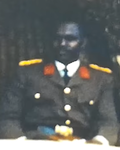Top Qs
Timeline
Chat
Perspective
List of presidents of Burundi
From Wikipedia, the free encyclopedia
Remove ads
The president of Burundi is the head of state and head of government of the Republic of Burundi. The president is also commander-in-chief of the National Defence Force. The office of the presidency was established when Michel Micombero declared Burundi a republic on 28 November 1966.[1] The first constitution to specify the powers and duties of the president was the constitution of 1974, which was adopted in 1976.[2] Written by Micombero, the constitution affirmed his position as the first president of Burundi.[3] The powers of the president derive from the latest constitution, implemented in 2005 as a result of the 2000 Arusha Accords after the Burundian Civil War.[2]
Nine people have served in the office since Burundi became a republic. Only one president, Pierre Buyoya, has served on two non-consecutive occasions.[4] Sylvie Kinigi was the first and only woman who has served in the role (on an interim basis).[5] The current president, Évariste Ndayishimiye, has been serving in the role since 18 June 2020.
Remove ads
List of officeholders
Summarize
Perspective
- Political parties
- Status
- Symbols
† Died in office
Remove ads
Timeline

See also
Notes
- On 21 October 1993, President Ndadaye and several other officials were killed by Tutsi soldiers in a coup attempt, leaving Prime Minister Kinigi the highest-ranking official alive and the de facto head of state of Burundi. Kinigi joined her surviving ministers in the French embassy until she could return to her residence under French military guard as the coup failed.
- On 8 November 1993 the Constitutional Court ruled that "the government acting collegially" assumed the responsibilities of the interim presidency until a new president could be elected.[11]
Remove ads
References
Wikiwand - on
Seamless Wikipedia browsing. On steroids.
Remove ads











